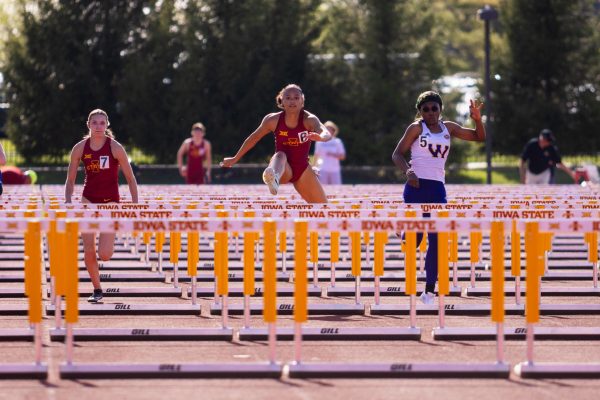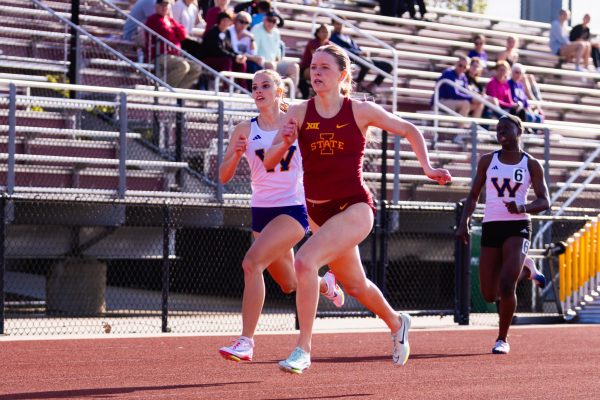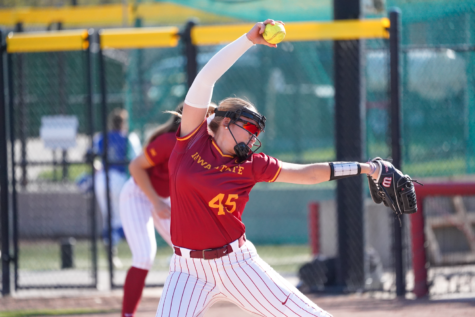Former Cyclones going to Olympic Team Trials
May 3, 2004
After qualifying for the Olympic Team Trials, former Cyclone wrestlers Cael Sanderson, Chris Bono and Zach Roberson have all continued to train.
Another gym rat, sophomore Nate Gallick, fell short of qualifying in the freestyle nationals in Las Vegas but won four matches at the regional tournament to send him to Indianapolis on May 21 for a shot at making the Olympic team.
“I’ve been working hard since the season ended,” Gallick said. “I knew I needed to win regionals to qualify, and I’m glad I’ll have the chance to compete for an Olympic spot.”
Just a sophomore, Gallick could be a marked man during next year’s collegiate season if he has a good showing at the trials. ISU head coach Bobby Douglas, recently named the fourth coach for the Olympic freestyle team, said a good finish would motivate Gallick and push him to succeed.
“It doesn’t so much put a target on his back, but more the spirit in his heart,” Douglas said. “This is just one of a number of steps he’s taking toward his dream.”
Wrestling at 132 pounds, Gallick said he believes he has a legitimate shot at making the Olympic team.
“In the matches I lost at nationals [in Las Vegas], I only lost by a couple of points,” Gallick said.
“I just need to continue to get better and prevent the little mistakes.”
After wrapping up a collegiate national championship earlier this year, Roberson said he also has switched his focus to making the Olympic team at 132 pounds.
“I think I can beat anyone in my weight class,” Roberson said. “It will be a big challenge, but I think I can wrestle with all of them.”
Douglas said anything is possible during the Olympic trials.
“[Gallick and Roberson] will probably wrestle better than they ever have in their entire lives,” he said. “They are long shots, but they have a shot.”
Two former Cyclones with great chances of making the team, Sanderson and Bono, will be looking to avenge championship match losses on their way to the trials.
“I knew I’d have to win the trials whether I won nationals or not,” Sanderson said. “It’s disappointing to wrestle poorly, but I know nothing has changed and I need to be on top at the trials. I have to get excited about things — I’m trying to have a good time and wrestle the best I can.”
Bono, who lost 4-3 in overtime to Jamill Kelly, said he plans to dictate the pace of his matches.
“I wrestled too much at [Kelly’s] pace in the championship,” Bono said. “When the match was over, I still had a lot [of energy] left, and I didn’t leave it out on the mat. I know I need to wrestle my own match, [and] I plan to do that.”
Ranked second nationally at 145.5 pounds, Bono said he believes he can be on top.
“Physically, I’m in the best condition of my life,” he said. “Mentally, I know I’m better than anyone else out there.”
With four Cyclone wrestlers training for the same goal everyday, Sanderson said the team aspect takes shape with the matmen pushing one another to work harder.
“It’s a lot easier to train with guys on your team, and it’s a lot easier to get that extra work in when everyone’s doing it,” he said. “I’ve just been trying to focus on my personal area of concentration — areas I need help on.”
Bono, an assistant coach for the ISU wrestling team, said he shares a one-of-a-kind relationship with the Cyclone wrestlers.
“In this freestyle thing, we’re all teammates,” Bono said. “It’s a really unique situation to be able to go from being their teammate to kicking them in the butt as their coach.”
As a wrestler, Bono said there is no better coach than Douglas.
“He’s teaching me things,” he said. “He’s teaching me the ropes and why he does things. He puts me in situations where he makes me make decisions. I’ve been in all the situations, and I’ve been there before, but he’ll throw just little insights at me, and it just makes a world of difference. Without a doubt, in my mind, he is the best coach in the world.”
Douglas said the work ethic of the wrestlers has been outstanding this offseason and that their work will eventually pay off.
“I see there’s a new type of intensity after the season that I haven’t seen,” Douglas said. “A lot of it has to do with preparation for the Olympics, and that’s why we have an Olympic development-type program.”
















